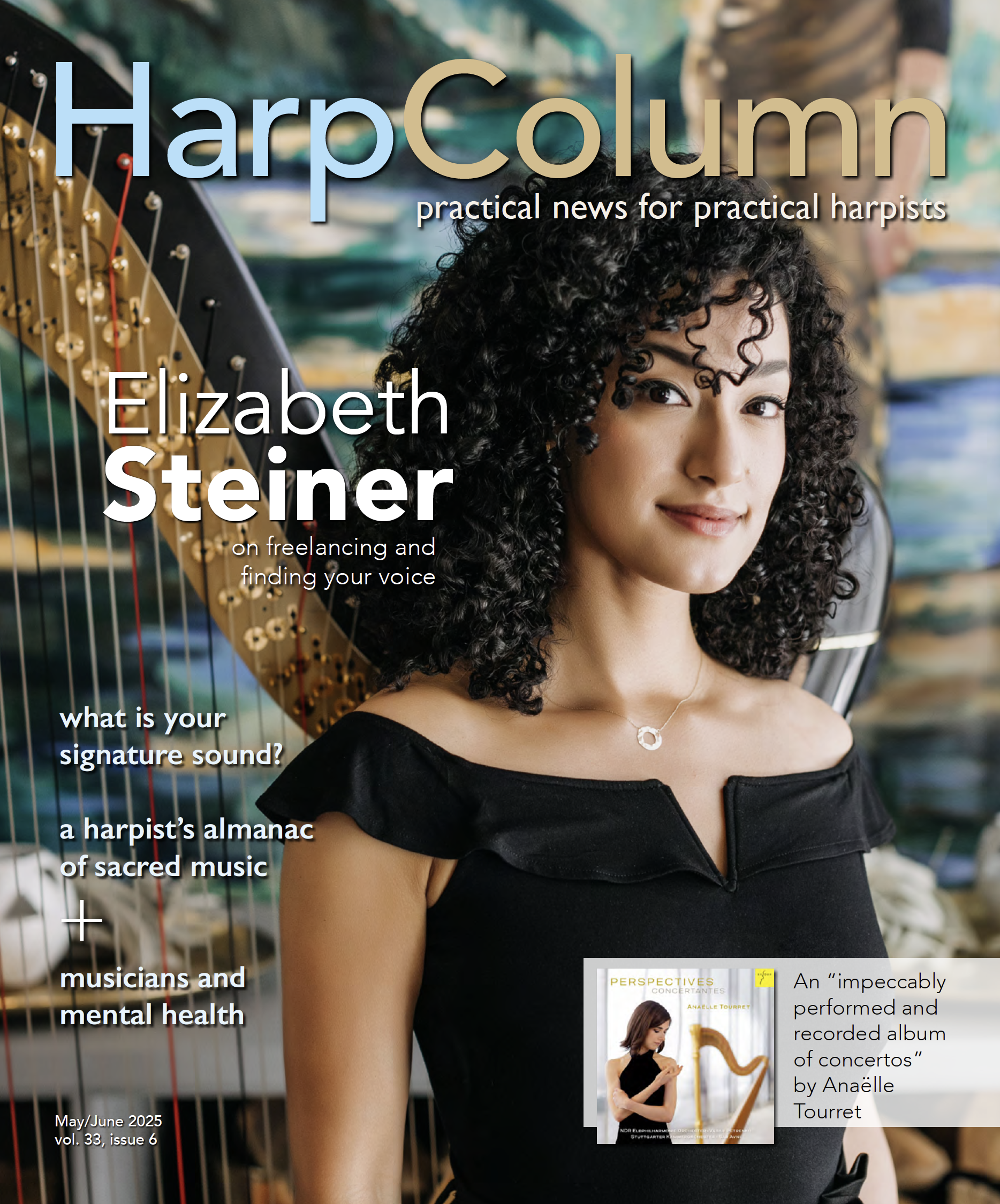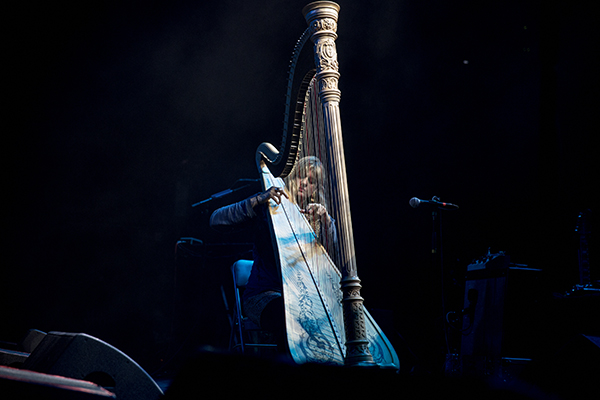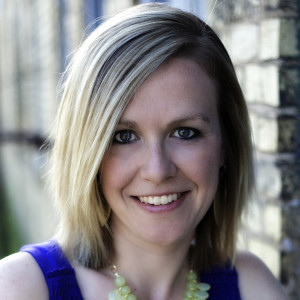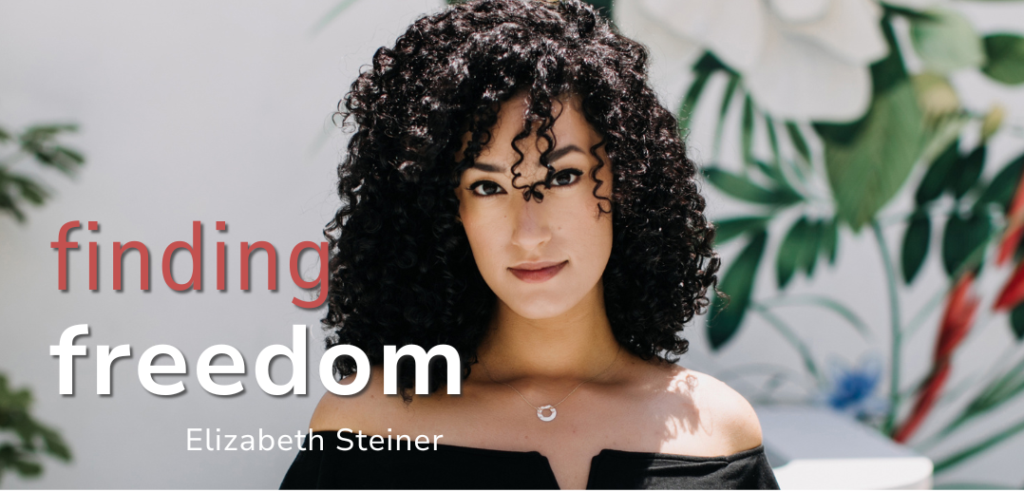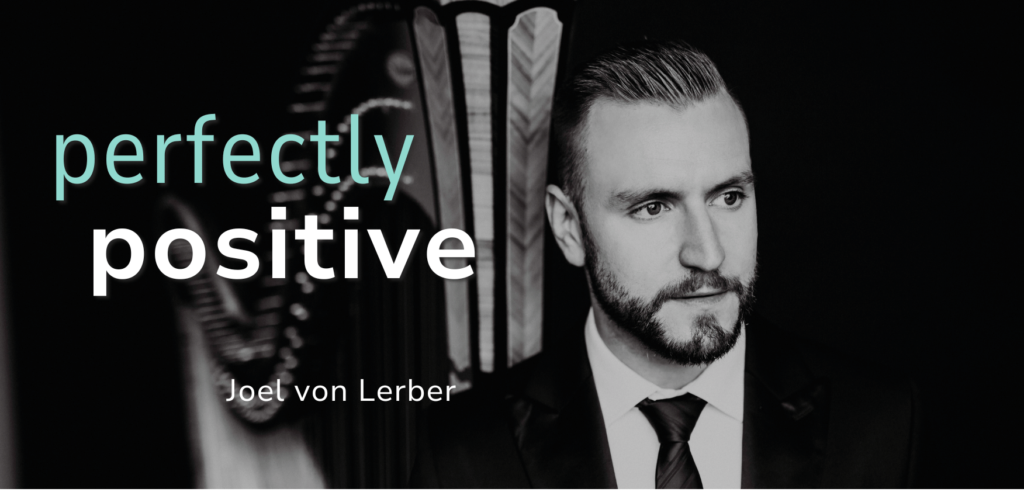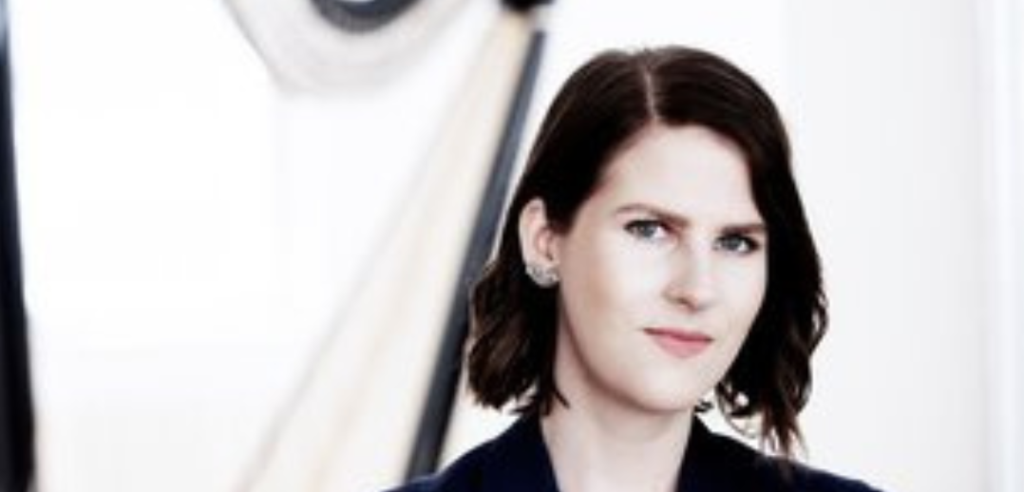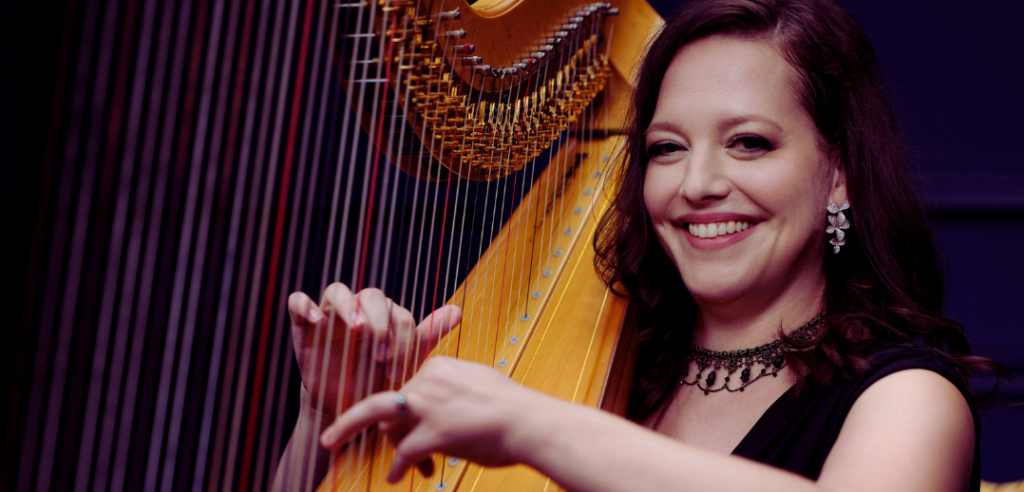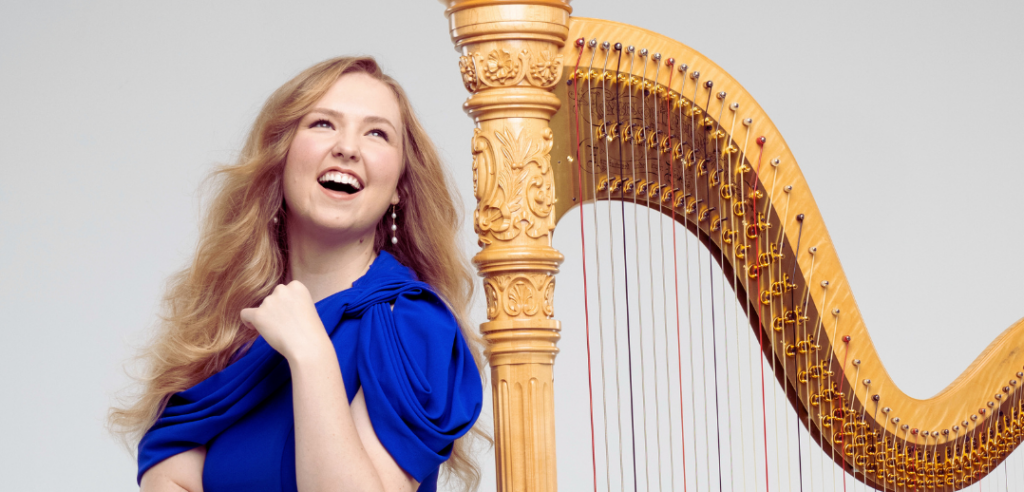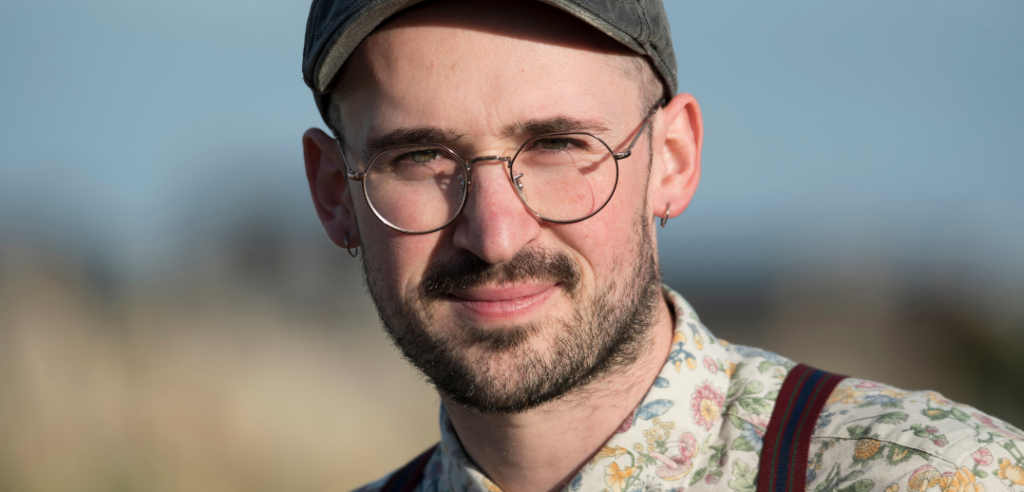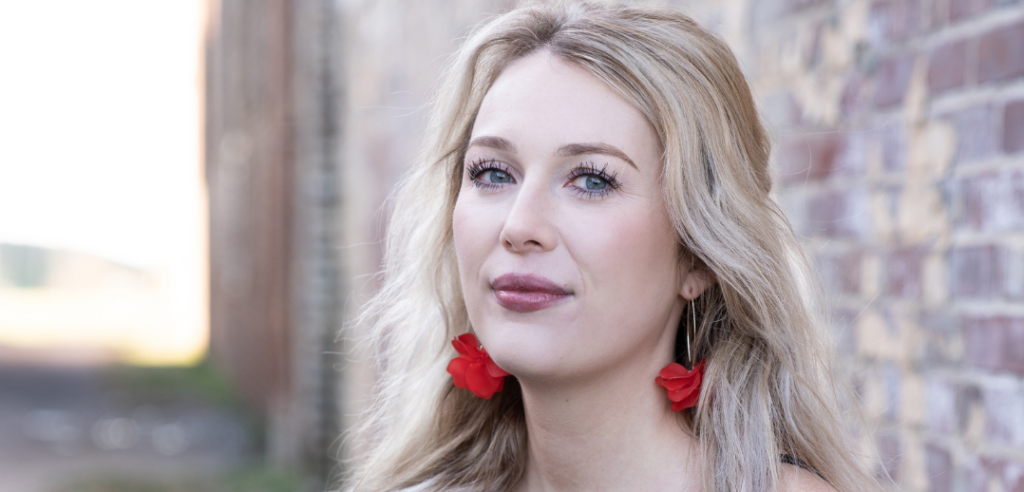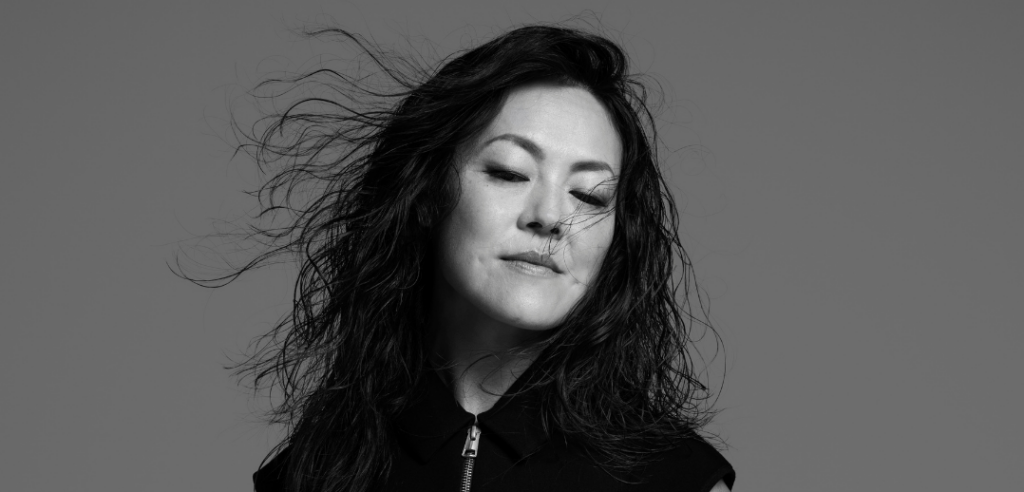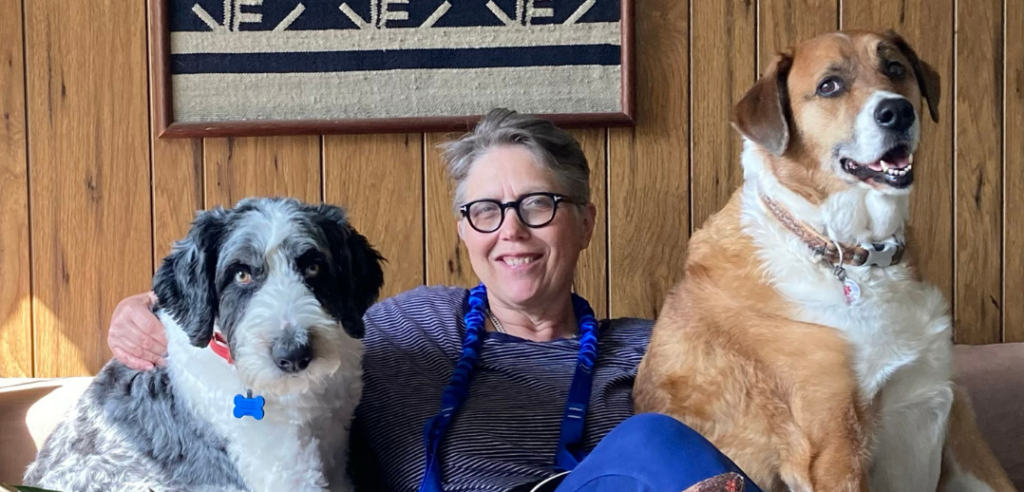Mary Lattimore loves life on the road, which is a good thing since she spends more than half the year crisscrossing the country and traipsing overseas to play for crowds of people. These crowds aren’t your typical harp audience, though. Lattimore plays in nightclubs, indie music festivals, and the occasional dive bar that rarely, if ever, see a harpist on stage. In fact, Lattimore says she is often the first harpist to ever play most venues where she’s booked.
Lattimore’s unique style has not only earned her the respect of many in the music business to whom the harp might as well be a piece of parlor furniture, but also garnered a faithful following of fans. She also got the attention of the Pew Center for Arts and Heritage in Philadelphia, which awarded her one of its prestigious fellowships in 2014. Her latest solo release, Hundreds of Days (2018), received national attention, with a National Public Radio review calling her “one of the country’s most compelling soloists” and The New Yorker proclaiming her “complex and expansive songs” evoke “seismic emotional shifts.”
So how did Lattimore—a classically trained harpist—end up playing with some of the biggest names in indie rock and making a name for herself as a soloist in a corner of the music world, uncharted by the harp? Well, we’ll get to that…it’s a long story. First, we have to begin where we found ourselves back in mid-May when Lattimore met up with us on a video chat—everyone’s all-too-familiar meeting place during the coronavirus pandemic. Lattimore should have been on tour in Europe that particular Friday we talked. Instead, she was at home in Los Angeles, grappling with the new reality of being a musician during widespread lockdowns and missing the connection with live audiences that she thrives on.
HC: Let’s start with what your musical life looks like as we are in the middle of this pandemic and nearly two months deep into stay-at-home orders in most states.
ML: I moved into a new apartment in November, and two good friends of mine live right next door, so we have been kind of quarantined together. As a single person living alone with no kids, I feel really lucky to have friends through this. But now at least I have some projects. Paul Sukeena, this really great guitar player, and I have been making music together. He plays with Angel Olsen and some other bands. He’s usually on tour a lot too, and so the two of us have had time. We got hired by Nike to do sound bites every week for their employees. I played a [virtual] show for Madewell, the clothing company—that was fun. Tomorrow I’m going to play another virtual concert for a public library in Maine. I’m not playing anywhere in public, but [the jobs are] slowly dribbling in and kind of making up for the fact that all my tours were canceled.
HC: Right, you’ve had all of your upcoming tours canceled because of the pandemic.
ML: I was supposed to be in Europe for a month right now. So it’s pretty heartbreaking to think about the things that were supposed to happen that aren’t. I have a record coming out in September that I worked really, really hard on. Now, all those dates are getting canceled, too. It’s kind of unrealistic to think that I can play in these public places for a couple hundred people in the fall. I just don’t think it’s going to happen.
HC: Have you found this unexpected down time to be productive?
ML: I have to say that I’m not feeling very creative as far as sitting down at the harp and coming up with ideas. That’s very unusual for me—it usually feels very natural—the harp is like my voice. Usually I feel like it’s part of my body; I feel very much like I can express myself through the music. But right now, it’s just not flowing, and I don’t want to force it.
HC: It’s kind of a relief to hear someone as creative as you say things like that. I think a lot of people, a lot of artists are feeling that way—on one hand you’ve got this gift of time that you don’t usually have, but on the other hand you’re not in your typical head space.
ML: Yeah, it’s really hard right now. You’re exactly right. I’m on day 63 in quarantine. I’m thinking I could have written so much music and gotten so much session work, and learned French. But you can’t force it, especially with music. This producer, Butch Vig, he’s producing a record of one of his bands, and he asked me to play on a single. I know that it would be good for my career to keep on the radar of people who are successful in production and songwriting. He asked me to play in a cover version of a song, and I just kept putting it off because it just wasn’t coming at all. He finally had to write me, and he said, “Are you okay? We’re ready to work on your part and put all the parts together.” I said, “I am so embarrassed right now, but there is something that is not flowing.” He wrote me back, and he said, “I feel the exact same way.” It’s a concentration thing, I think. In this age of so much information, you want to know about everything that’s going on, but you subconsciously absorb all that information.
HC: So in the work that you said has been trickling in, how are you finding the process of working from home and playing for other people from your home?
ML: Part of me loves it because I don’t have to move a harp. [Laughs] It’s easy to set up in your living room. When I did the project for Nike, they actually sent a really nice mic for us to use, and I got to keep it. So I have been experimenting recording myself at home. I made a couple of records recording myself, and I have it pretty dialed in as far as recording goes. I can even record remotely for other people’s records. My friend Paul is very good with an amp, too, and he’s been helping me get out the feedback, so I’m pretty lucky that I have someone that knows a lot about amplification to help me out, but it’s going pretty smoothly. I think audiences like the personal feeling of someone kind of broadcasting from their home to your home. It feels like we’re kind of all in it together in a way.
HC: There is something very leveling about this whole experience.
ML: Yeah, no one’s really dressing up, it’s not glamorous, all the pretenses have broken down. This is the nicest outfit I’ve worn in 63 days. [Laughs]
HC: Well let’s talk about the path you’ve taken to get to where you are now, because I think it’s fascinating. Your mom is a harpist. Tell us what it was like for you growing up.
ML: My mom’s been a harpist since she was a child, and she is in love with the harp. Growing up, we had harp ensembles at our house and things like that, so I was very immersed in it from a young age. I started playing piano when I was 5. But then eventually it felt like it was time for me to start learning the harp. I started when I was 11, but my mom thought it would be better if I took lessons from a friend of hers rather than her, just to maintain our relationship. I started taking it with a friend of hers in North Carolina, and then I moved on to Bette Roth, the harpist with the Charlotte Symphony. She was my harp teacher from eighth grade until I graduated. She was a major mentor. Weekly lessons and youth symphony were an hour-and-a-half drive each week, so there was a lot of commitment from my mom. She’s very supportive. I feel really lucky in that I was just made to feel like the harp was a very normal thing to play. The harp was very ingrained in the fabric of my childhood, and I felt like it was very natural for me to play. She’s always been very supportive, which is cool. She’s also a really good harpist. My mom’s sound and her tone are very warm. I’m sure I absorbed her sound listening to her practice.
HC: Beyond your mom, who were your musical influences growing up?
ML: I only played classical music growing up, but I really loved listening to the Cure and ’90s bands and lots of North Carolina indie rock. I definitely kept the music that I played on the harp separate from the music that I listened to.
HC: Interesting. So then you went to Eastman to study classical harp in college. How did these dual musical interests end up merging?
ML: Well, I definitely didn’t have any idea that they could ever merge. I didn’t even think that I could translate the harp into sad British goth music or whatever I was listening to. At the same time, I was really into both. So I studied at Eastman very seriously, and I was also working for the radio station at the University of Rochester, and I was working at a record store in Rochester. I loved all this music in the big picture, but I kept them very much separate. When I graduated from Eastman, I moved to Vienna for a couple of years to teach English. When my visa ran out, I moved to Philly. There I started meeting these people that played in bands like Kurt Vile, Espers—people that were creating the rich musical community in Philly. These friends of mine were the ones who suggested that I sit in and jam with them. Before I moved to Philly, I was in Columbia, Missouri, hanging out with the friend, and we went to go see Arcade Fire. They were just a small band at the time, playing a small club. That’s so funny to think about now. [Laughs] My friend and I ended up staying kind of after the show at the bar, and we started talking to the band members. The bass player, Richard, was like, “Oh, you play the harp and you’re moving to Philly? We’re coming to Philly soon, why don’t you sit in with us? There are harp parts on the record.” I said “Really? You want me to play with the Arcade Fire?” He said, “Yeah, all you have to do is play the parts that are already written. [Ed.—Liza Rey Butler, mother of two Arcade Fire band members, wrote and recorded the harp parts on their album Funeral.] Just learn them and we’ll meet you in Philly and you can sit in with us.” I couldn’t believe someone wanted me to play in a band for a minute! As a classical musician, I had never played anything that hadn’t been written on the page, so that just got my wheels spinning. A week later they were in Philly, and I brought my harp. I was very, very nervous. They invited me onstage to play the encore, and it was amazing! The show was sold out, everyone was cheering, there were people as far as the eye could see, they called my name—I think that’s where I caught the bug. The feeling I got from it was this version of the thrill that you get when you’re playing with the orchestra and everyone is working together in one unit—it’s that feeling of swimming around in sound. After that, all my friends in Philly who were playing in bands were asking me to join them. At that point, the only band I had ever played with was Arcade Fire, and those parts were written down. So I had to get my brain into the mode of writing parts and thinking about melody lines in ways that I could fit the harp into these guitar-based songs. It was thrilling to start to think about the harp as a ribbon of melody within a song. I think a lot of that came from working with Ms. [Kathleen] Bride [at Eastman]. During my lessons, she would just sing the melody line. In a lot of the pieces, there are so many interlocking parts that you tend to lose the melody if there are treble and bass. So she had this way of singing the line and showing you where the line went throughout the song. I always kept that. I still think about that all the time—finding the distilled bass melody. I like thinking about the basic melody as being what the human ear is yearning to hear. I think about that when I write parts. It can be really simple—people respond to the simplicity of a melody. If you find that basic, beautiful part, it doesn’t have to be complicated.
HC: When you started playing with bands, you must have felt like an outsider. Working with musicians who had probably never worked with a harpist before—what was that like? Did you ever feel like you had to prove yourself? Or was it more like everybody loved you because they had never worked with a harp before?
ML: It was a combination of both. The harp is definitely seen as a special thing. Not a lot of people know how it works, so it’s still magical to people. But at the same time, what isn’t magical is when you go on tour with the band, and they have to help you carry the harp up the fire escape into the venue. I think that having to move it and tune it and amplify it—all those things make it more terrestrial. Those things ground it to the point that my instrument seems like everyone else’s instrument. The practical side kind of equalizes the magic.
HC: Tell us a little bit about the not-so-glamorous side. You’ve done a ton of touring—way more than the average harpist. What have you learned along the way?
ML: I’ve learned to ask in advance if there are stairs at a venue so I can prepare. [Laughs] I’ve also had to rent a lot of harps in a lot of different cities, and I’ve found a lot of generosity in the harp community throughout the world.
HC: Do you usually take your own harp on tour or do you rent?
ML: It’s about half and half. In Europe I own a harp that lives in Prague, so that’s usually where my European tours start. If I’m opening for a band that has a bus, then I ride on the bus, and I have to find harps in each city, which is really tricky. A lot of times it’s me and my car and my harp driving across the country. That’s the way I like to do it. I can listen to podcasts, manage my time, arrive in time for the soundcheck, and feel like I’m in control.
HC: Logistics are something no other band member really has to think about. So you were playing with bands for maybe eight or nine years before you made your first solo recording. What drove you to create something that was your own?
ML: Well, I was playing a festival where I met Thurston Moore from [the band] Sonic Youth. He said, “Mary, do you know how to surf?” I said, “No, that’s a random question.” Then he said, “Well, you better learn, because I want to take you to Malibu and we’re gonna make a record with Beck.” My mind was blown. I said, of course, I would love to do that. So we flew to L.A. and went to Beck’s studio in Malibu and recorded with him, along with my friend Samara [Lubielski], who plays violin. We made this record in 2011, and I was subsequently on tour with those guys for two years throughout the world, which was amazing. But then it came time for Thurston to make his next record, and he decided that he didn’t want to have harp on the record. I was devastated. My dream had come true in making this record and touring, and I remember writing to a friend and saying, “I don’t have any other dreams.” It was so sad because the coolest thing I could have thought to do was over. What am I going to do now? I’m going back to Philly, and I guess I’ll work at the record store and just be a babysitter. This thrilling adventure had come to an end.
Back in Philly I began thinking maybe I should rent a little studio time with a friend who’s an engineer and producer, and maybe I’ll just see if anything comes out. I had learned to improvise through Thurston. He gave me a lot of confidence. He always told me, whatever is in your brain, just like feel it out. To go from being organized, thinking about melody lines, and thoughtfully composing to just feeling it out in front of someone that I had listened to for many years was hard. I think it might be harder for classically trained musicians to really feel it out and improvise and jam with people in this primitive way after you’ve been very disciplined about learning a certain way to play. So when it came time for me to try out solo improvising in the studio, I just did it. I made that record in one day. One afternoon I just sat down and played from my heart because I was so sad about everything that had happened. It was a very cathartic way for me to experiment and to feel like I could do something without the other people in the band. From then on, I’ve just been playing primarily solo and using it as a way to cultivate my voice. I think I’ve found the foundational part of my voice, but I think that there’s room for experimentation and making new sounds for the harp that only make the voice more colorful.
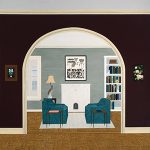
HC: I want to talk a little bit about that. Your most recent album, Hundreds of Days from 2018, uses some sounds that are so cool and so unique.
ML: Thank you. Well, I got the Pew Fellowship in Philly that gave me access to some artist residencies, and I won a spot at the Headlands in Marin County outside of San Francisco—it’s a national park that has this very beautiful artist residency. I brought all the instruments that I had, like keyboards I got from the thrift store, a bunch of [fx] pedals, a theremin, and some synthesizers. I thought, I’m going to make something out of this hodgepodge of instruments, primarily harp, and I’ll use my voice a little bit, even though I’m not a very good singer. Okay, this is my palette. I can make anything out of this combination of stuff, and I have all the time in the world and this landscape to draw from. All the parts came together, and I feel like the sounds were cool because I didn’t really play it for anyone. The sounds came purely from me. I wasn’t influenced by anything besides nature, and I wasn’t feeling intimidation or that I had to live up to any standards or anything. It was just pure.
HC: That’s interesting. We probably don’t realize how much other people’s feedback influences our decisions.
ML: I think also the fact that there wasn’t very much internet or cell phone service there also really helped. I read like 14 books in two months and went to bed early.
HC: What would you say you write your music about?
ML: A lot of it is memory—maybe a souvenir of a moment. That’s kind of how I think about it. It is a little snapshot of a feeling or a little time capsule. I try to make it pretty personal, because that is my voice. I’ll always have that to listen back. It’ll last forever.
HC: You mentioned the Pew Fellowship that you were awarded, which is an incredible honor. So for our readers who aren’t familiar with it, tell us about it and what it has meant for your career.
ML: It changed my life. It was crazy—at the time, I was working four jobs in Philly. The nomination process is anonymous. Each year 12 artists living in Philadelphia are selected. If you’re nominated, then you have to go through this application process where you write these essays and then they have a panel of professionals and accomplished artists come together for a weekend in Philly and look over all the essays and review all the samples and portfolios to decide who the winners of the fellowships will be. At the time, each fellow received $60,000, which is incredible. Now I think they’ve raised it to $75,000. It’s just a really incredible honor. You get the money spread out over two years, and you have to make a commitment to live in Philly for those two years. After they make the decision, they let you see your evaluation from your judges, and one of my judges was Zeena Parkins. She’s a hero. To read what she said about my pieces and my playing was really amazing. I definitely slept with her evaluation underneath my pillow for a while. She also had some critiques, too, and I needed to think about that. So it was a real honor to win, and it changed my life—I was working four jobs to cobble together a life. Once I got this money, I was able to quit some of the jobs, take road trips, and make music and feel more free. I do feel like having money in the bank gives you peace of mind, and it made me a lot more peaceful and able to just be free with my music.
HC: You spend a lot of time out on the road—does it ever get old?
ML: I’m really lucky in that I’m very flexible, and I love to be on tour—it’s my favorite thing. Last year I was on tour 215 days. I just really love playing the harp for people. I think it’s pretty amazing to play for people who’ve never seen a harp in person or to play in venues—rock clubs, festivals—that have never had a harp before. It’s a real thrill to be the first harpist in a place and to show the instrument to people who have never seen it before.
HC: So the fact that you normally spend so much time touring has got to make the last couple months even more of a stark change for sure.
ML: It’s been hard on the brain not being able to tour. When part of your identity is suddenly taken away, you think, “Who am I if I’m not this person?” You have to find some purpose. •
More about Mary
What’s your favorite podcast? I love this one called Sugar Calling. It’s from the New York Times, and it’s a writer who interviews writers, and during quarantine, gets their perspective on the world around them and how writing and reading has helped their quarantine times. Really beautiful voices.
What show are you binging? “Normal People” on Hulu. I just love it. It’s a really juicy drama based on a book by Sally Rooney that I read. It’s really good.
What are you reading? I just read Severence. I vowed not to read or watch anything about an apocalypse or disease right now, but I had a friend come and stay at my place while I was away, and she left me this book. It’s been in my stack to read for a year, so I pulled it and I started reading it. I thought it was going to be an office comedy or something, but it was about a woman and a pandemic where everyone died from a fever that originated from China. By the time I got to the part where the world was in decline from a pandemic, I thought, “Well, I’ve already invested this time. I can’t just put the book down now.” It was written in 2018 and is pretty prescient.
Coffee or tea? Coffee with a little milk.
What’s the last album you bought? Alice Coltrane Live at the Berkeley Community Theater—it is very, very beautiful.
How do you prefer to listen to music? I like physical records. I like the physical medium. I like being able to see all the liner notes and the beautiful artwork. I’ve been ordering a lot of stuff to help keep record stores alive.
Mountains or ocean? Maybe the mountains by the ocean, like Big Sur.
Heels or flats? I always wear flats. I’m so tall that wearing heels is dangerous.
If you could play with any musician, living or dead, who would it be? I’ve gotten to play with Harold Budd, who’s a really beautiful composer—elderly guy, a legend—and he wrote me a piece recently, which was a dream come true. So I think I have to come up with a new dream. I think it would be Brian Eno. He’s one of my heroes, too.
If you were not a harpist, what would you do? I think I’d like a job where you could pick out furniture for someone else’s home. It’s fun to put everything in its right place and make things beautiful.




